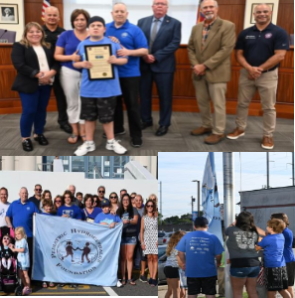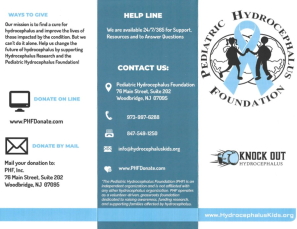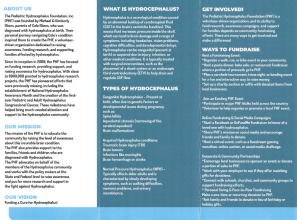Eaton boy battles hydrocephalus, sparks mother to start advocacy group to help
September 29, 2015 by PHF
Filed under Uncategorized
Comments Off on Eaton boy battles hydrocephalus, sparks mother to start advocacy group to help
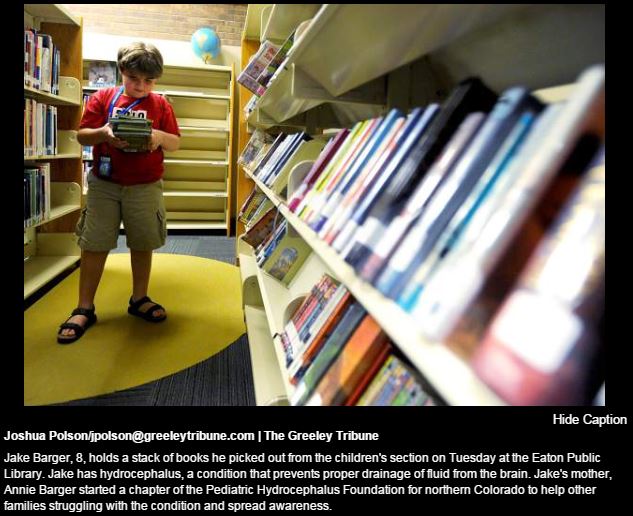
Jake Barger shakes his brown hair in front of his eyes at the Eaton Public Library as he talks about his favorite book series this week. It’s a tie between Magic Tree House and The Boxcar Children. He decides right then to write a crossover novel. The 8-year-old wants to be a judge, a doctor and at this moment, he’s decided to be a writer, too.
Jake’s mom, Annie Barger, watches proudly as her son chatters away about his plans. By now, he’s planning to bring The Avengers into his book. There might even be a movie deal, so he’s added director to his future resume. At this point, Annie’s eyes begin to tear up. Years ago, she didn’t know if Jake would have much of a future.
Annie was seven months pregnant with Jake when an ultrasound showed hydrocephalus in his developing brain. Hydrocephalus, or simply, fluid on the brain, is a birth defect, affecting one or two babies out of every thousand, according to the National Institute of Neurological Disorders and Stroke. There are multiple kinds of hydrocephalus, but in Jake’s case, one of the pathways in his brain where the natural fluid can drain is too narrow, causing it to build up. The Hydrocephalus Association estimates more than a million Americans live with the disorder. It’s the most common reason for brain surgery in children, according to the association. Jake’s first surgery, after all, came when he was 21 days old.
Jake was delivered via caesarean section at the University of Colorado Hospital in Aurora. The doctors told Annie and her husband, Paul, if he survived the delivery, he would be severely disabled all his life. After he was born, doctors told Paul they couldn’t believe they were looking at the same baby they’d been observing in utero. He was too responsive and energetic. Jake’s been surprising people ever since.
As well as Jake does, the defect still is a constant struggle. That’s why Annie started the northern Colorado chapter of the Pediatric Hydrocephalus Foundation. She’s in the process of organizing a fundraiser she hopes will take place by spring. The foundation raises money for hydrocephalus research and provides resources for those suffering from it, as well as education.
Annie’s main goal is to teach people what hydrocephalus is and how to properly handle emergency situations with people like her child.
“Being very vigilant and very proactive in advocating for your children is something that I do, maybe more than I need to, but it’s gotten us really far,” she said. “He’s the reason that we breathe.”
Jake’s had five surgeries. He has a shunt connecting the narrowing in his brain down to his stomach so the fluid can drain. The medical bills are endless, and so are the worries for Paul and Annie. They have to be hyper-vigilant. A headache or nausea could mean a shunt malfunction for Jake. If he complains of pain, or if he’s having trouble finishing his meals, Paul and Annie have a three-day rule — for the three days following the incident, Jake has to take it easy.
For Jake, a bad respiratory infection could cause an infection along the tube, which could be life threatening. Though he hasn’t had a seizure in years, another could always come. Even on a peaceful, happy morning, Annie fears what the afternoon might hold.
Another problem arises every time Jake steps out the door. Despite the commonness of hydrocephalus, not many know what it is or how to handle the disorder. Annie said she fights an uphill battle of education.
For example, once after a trip to the emergency room via an ambulance, a doctor insisted Jake showed symptoms of meningitis and wanted to give the boy a spinal tap. Because Jake’s fluid drainage is regulated by his shunt, a quick shift like that caused by a spinal tap could give him a stroke, Annie said. The doctor wouldn’t listen to her refusals and threatened to call child services if she wouldn’t let him get the procedure.
In school, Jake’s first-grade teacher exacerbated the behavioral issues that come with his disorder by refusing to listen to the medical reasoning or work with him on ways to improve. The hydrocephalus causes Jake to be a very linear thinker. He follows rules and does things as he is told. If he is told to use a blue marker to color a page one day, but then the next, he is told he can’t use that marker, he can get frustrated.
Some teachers were very understanding, though. Jake’s second grade teacher, Jen Delich, worked extensively with Jake to accommodate his needs and help him learn. Annie said she was incredible with him.
As Jake carried a big stack of Magic Tree House books to the front of the Eaton Public Library, Annie lagged behind, smiling as her boy struggled to balance the unwieldy load. He has no depth perception, but has learned to compensate for it, so it’s hardly noticeable. When he’s excited, he spins around in little circles, which he thankfully waited to do until the books were safely on the checkout counter. After the librarian scanned the barcodes and handed the heap back to Jake, he heaved them back into his little arms and hurried over to Annie to put them in the book bag.
“I’m training for American Ninja Warrior,” he said, flexing his little boy muscles.
Add it to the job list.
Editor’s note: This story has been edited from its original version to reflect the grade of one of Jake’s teachers.
Rare medical condition is a ‘ticking time bomb’: Foundation organizers raise $4,000 for research on hydrocephalus
September 22, 2015 by PHF
Filed under Uncategorized
Comments Off on Rare medical condition is a ‘ticking time bomb’: Foundation organizers raise $4,000 for research on hydrocephalus
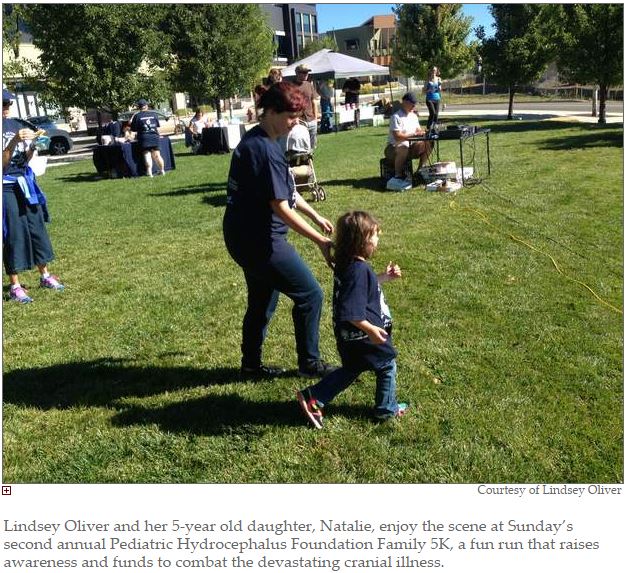
Everyday is a “ticking time bomb” for parents whose children suffer from a not very well-known medical condition that at any moment can strike.
On Sunday, about 40 people participated in the second annual Pediatric Hydrocephalus Foundation Family 5K to do just that: raise awareness about the devastating illness.
It’s called hydrocephalus, and it occurs when natural passageways that drain fluid from the brain fail. As a result, an excessive amount of fluid builds up in the brain, causing seizures, learning disabilities, restricted movement and the loss of memory. Because the condition affects the brain, the symptoms are incredibly wide and varied, and oftentimes severely damaging.
Not much is known about what causes the condition, and the only current treatment is to surgically insert a shunt system, which is basically a tube that diverts fluid to parts of the body where it can be naturally absorbed. Tubes last only five years and must be replaced for a child to survive.
For the parents who organized the race at the Three Springs Plaza, hydrocephalus is a constant anxiety, living one moment to the next not knowing whether their child will suffer a stroke or have a tube fail, which requires an emergency airlift to a hospital.
“You see him running around today, but tomorrow something could happen, and he could be in surgery,” said Christina Brown, an organizer of the event whose 5-year old son, Jaden, has hydrocephalus. “It’s kind of like a ticking time bomb.”
Brown said she’s spent countless hours in the hospital, many times having to travel to Denver to get her son the treatment he needs to survive. When Jaden was born, doctors told Brown her son would never be able to walk or talk.
At Sunday’s event, Jaden was doing both those things, dancing to the songs of singer-songwriter Melanie Melbourne. It was one of the good days, Brown said, spent outside rather than in a doctor’s waiting room.
Lindsey Oliver, a single mother, said she has friends and family who help with her 5-year old daughter Natalie’s care, but the unnerving threat of an episode always keeps her on edge.
Natalie had a seizure when she was 2½ months old, and spent the first three months of her life in the hospital. Since then, she has had 12 operations and has been airlifted three times. She also suffers from epilepsy.
“It’s such a tiring thing, never knowing when something might happen,” Oliver said. “That’s why it’s such a big moment to see her and the kids interact so well. It really touches your heart. These kids battle everyday.”
Research and awareness about hydrocephalus are still developing, and groups like the Pediatric Hydrocephalus Foundation are on the forefront of advocacy. Officials there estimate the medical condition occurs in 1 out of every 500 births.
You can be born with hydrocephalus or acquire it later in life. Adults have also been known to suffer from the lifelong condition, and an average of 40,000 shunt operations are performed annually.
Brown said Sunday’s race raised about $4,000 to go toward the Pediatric Hydrocephalus Foundation.
PHF In The News: Fundraiser walk to be held Sept. 20 for pediatric ailment
September 7, 2014 by PHF
Filed under Uncategorized
Comments Off on PHF In The News: Fundraiser walk to be held Sept. 20 for pediatric ailment
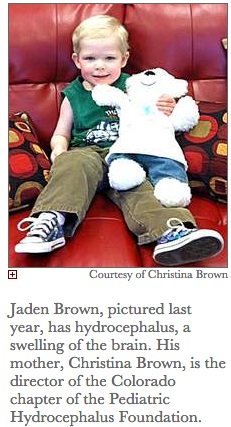 Durango city councilors were set to approve Tuesday a proclamation drafted by Christina Brown that adds hydrocephalus to the crusades, causes and campaigns for which September is recognized.
Durango city councilors were set to approve Tuesday a proclamation drafted by Christina Brown that adds hydrocephalus to the crusades, causes and campaigns for which September is recognized.
Brown, whose son, Jaden, 4, has the condition, gained a similar proclamation last summer from Gov. John Hickenlooper. September was designated National Hydrocephalus Awareness Month by Congress in 2009.
Hydrocephalus, found in about 1 in 500 births, is a swelling of the brain caused by the accumulation of the fluid that surrounds the brain and spinal cord.
Brown, chairwoman of the state chapter of the Pediatric Hydrocephalus Foundation, said Tuesday that a 5-kilometer walk fundraiser for the cause is scheduled Sept. 20 in the Three Springs area.
The 5K walk begins at 10 a.m. at the plaza, 175 Mercado St., near Mercy Regional Medical Center. Walkers can register starting at 9 a.m.
Online registration can be done at http://www.active.com/donate/phfwalkco2014
daler@durangoherald.com
PHF in the News: Hickenlooper recognizes brain-swelling condition
September 6, 2013 by PHF
Filed under Uncategorized
Comments Off on PHF in the News: Hickenlooper recognizes brain-swelling condition
Durangoan, whose son has hydrocephalus, pressed for Colo. representatives’ support

The proclamation by Gov. John Hickenlooper designating September as Hydrocephalus Awareness Month came through the effort of a Durango woman whose son has the condition.
Christina Brown drafted a proclamation in mid-July and sent it to the governor’s office. She learned a month later it had Hickenlooper’s signature.
Brown’s son, 3½-year-old Jaden, has hydrocephalus, a swelling of the brain caused by an accumulation of the fluid that surrounds the brain and spinal cord, a condition found in one in 500 births.
About 1 million adults and children in the United States have hydrocephalus.
Brown said she found support from the region’s representatives in Washington, D.C., when she visited Capitol Hill with 140 members of the national Pediatric Hydrocephalus Foundation last week. The contingent represented the country from coast to coast.
Brown is the founder and director of the Colorado chapter of the Pediatric Hydrocephalus Foundation. She can be reached at christina@hydrocephaluskids.org.
She said U.S. Sens. Mark Udall and Michael Bennet and U.S. Rep. Scott Tipton appeared receptive when she urged them to support efforts to fund hydrocephalus education and research.
Brown said Jaden is doing very well and is receiving speech, physical and occupational therapy.
Contact Christina Brown at christina@hydrocephaluskids.org for more information.
Durangoan seeks hydrocephalus cure
September 12, 2012 by PHF
Filed under Uncategorized
Woman’s son, 2 years old, has brain condition
 The mother of a 28-month-old Durango boy with hydrocephalus has taken on the leadership of the Colorado chapter of the national Pediatric Hydrocephalus Foundation, a support group with a presence in 25 states.
The mother of a 28-month-old Durango boy with hydrocephalus has taken on the leadership of the Colorado chapter of the national Pediatric Hydrocephalus Foundation, a support group with a presence in 25 states.
“I’m promoting awareness of hydrocephalus and raising funds for research,” Christina Brown said Friday. “There is no cure now, which is unacceptable.”
Hydrocephalus is a condition in which cerebrospinal fluid accumulates in the brain. This can cause pressure in the skull, resulting in enlargement of the head, convulsion, tunnel vision, mental disability and possibly death.
The first fundraiser for Brown’s group is set for Sept. 23, when participants will bowl at Rolling Thunder Lanes at the Sky Ute Casino in Ignacio.
Brown began gathering information on hydrocephalus when a pediatrician recommended during a well-baby check at 4 months that her son, Jaden, be tested for a neurological disease. Examinations revealed that he had hydrocephalus and hemiplegia (stroke-induced spasticity) on his right side.
She rattles off facts such as:
One in 500 newborns receives a diagnosis of hydrocephalus.
The disease can be congenital or acquired.
Hydrocephalus is the No. 1 reason for pediatric brain surgery.
Americans spend $1 billion a year on treatment for hydrocephalus.
Research into diabetes is funded at $6 per person, hydrocephalus at 30 cents per person.
Brown was in Washington for two days two weeks ago with other families who have children with hydrocephalus to educate legislators and others about the disease and promote research.
“There were 20 families from 14 states,” Brown said. “We’ll contact them again next year for funding for research.”
Josh Green, a spokesman for U.S. Rep. Scott Tipton, R-Cortez, said the group left a packet of information for the congressman. Tipton wasn’t in the capital at the time.
Brown knows four families and one adult in Durango who have hydrocephalus in the family. She said there are about 30 similar families in the Four Corners.
“Jaden is fine,” Brown said. “He just had surgery as a result of being tongue-tied and is doing well.”
The recently formed hydrocephalus chapter held its first meeting in July. The next meeting is from 5 to 7 p.m. Oct. 12 in Durango Public Library.
 Read more at: https://html.com/attributes/img-width/>
Read more at: https://html.com/attributes/img-width/>











